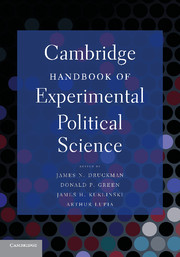Book contents
- Frontmatter
- Contents
- List of Tables
- List of Figures
- Contributors
- Acknowledgments
- INTRODUCTION
- PART I DESIGNING EXPERIMENTS
- PART II THE DEVELOPMENT OF EXPERIMENTS IN POLITICAL SCIENCE
- PART III DECISION MAKING
- PART IV VOTE CHOICE, CANDIDATE EVALUATIONS, AND TURNOUT
- PART V INTERPERSONAL RELATIONS
- PART VI IDENTITY, ETHNICITY, AND POLITICS
- 20 Candidate Gender and Experimental Political Science
- 21 Racial Identity and Experimental Methodology
- 22 The Determinants and Political Consequences of Prejudice
- 23 Politics from the Perspective of Minority Populations
- PART VII INSTITUTIONS AND BEHAVIOR
- PART VIII ELITE BARGAINING
- PART IX ADVANCED EXPERIMENTAL METHODS
- AFTERWORD
- Name Index
- Subject Index
- References
22 - The Determinants and Political Consequences of Prejudice
Published online by Cambridge University Press: 05 June 2012
- Frontmatter
- Contents
- List of Tables
- List of Figures
- Contributors
- Acknowledgments
- INTRODUCTION
- PART I DESIGNING EXPERIMENTS
- PART II THE DEVELOPMENT OF EXPERIMENTS IN POLITICAL SCIENCE
- PART III DECISION MAKING
- PART IV VOTE CHOICE, CANDIDATE EVALUATIONS, AND TURNOUT
- PART V INTERPERSONAL RELATIONS
- PART VI IDENTITY, ETHNICITY, AND POLITICS
- 20 Candidate Gender and Experimental Political Science
- 21 Racial Identity and Experimental Methodology
- 22 The Determinants and Political Consequences of Prejudice
- 23 Politics from the Perspective of Minority Populations
- PART VII INSTITUTIONS AND BEHAVIOR
- PART VIII ELITE BARGAINING
- PART IX ADVANCED EXPERIMENTAL METHODS
- AFTERWORD
- Name Index
- Subject Index
- References
Summary
Researchers have been interested in the distribution of prejudice in the population, as well as its effects on policy preferences, vote choice, and economic and social outcomes for racial minorities, since the dawn of the social sciences. One of the earliest scholars to address these questions was W. E. B. DuBois (1899) in his classic work, The Philadelphia Negro. Referring to prejudice in chapter 16 of his book, DuBois wrote, “Everybody speaks of the matter, everyone knows that it exists, but in just what form it shows itself or how influential it is few agree” (322). Although these words were written more than 100 years ago, this observation still does a good job of summarizing our understanding of prejudice. There have been, to be sure, significant advances in this literature since the time of DuBois, but social scientists continue to disagree about the influence of racial prejudice in modern American politics. The aim of this chapter is to explore and adjudicate some of these differences, paying particular attention to the strengths, limitations, and contributions provided by the use of experimental methods.
Before examining the ways that scholars have studied prejudice, it is important that we define this term. What is prejudice? Social psychologists were among the first to answer this question.
- Type
- Chapter
- Information
- Cambridge Handbook of Experimental Political Science , pp. 306 - 319Publisher: Cambridge University PressPrint publication year: 2011
References
- 10
- Cited by

